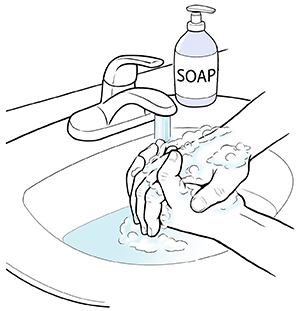Chemotherapy Safety at Home
As part of your cancer treatment plan, you may need chemotherapy (chemo). During chemo, you are given strong medicines to kill cancer cells. They can be given by different methods. such as oral (by pill), intravenous (through a vein), by injection (a shot), and other methods. Chemo medicines can stay in your body for up to 48 to 72 hours after the last dose of chemo is given. Some chemo medicines may take longer to leave your body. During this time, they may be in your body fluids.
For instance, the chemo may be in your:
-
Urine
-
Stool
-
Vomit
-
Blood
-
Tears
-
Sweat
-
Semen or vaginal fluid
Chemo can be irritating and possibly harmful if it touches skin. So you need to make sure caregivers and others close to you are not exposed to your body fluids during chemo and for a few days after the last dose of chemo treatment. It's OK to have normal contact with other people, including hugging and kissing.
Ask your cancer treatment team if there are any special precautions you should take. And follow these general precautions to protect loved ones and even pets from chemo.
Be prepared
One good safety measure is to have throw-away gloves at home, just in case your body fluids need to be cleaned up. These can be bought at most pharmacies. Gloves can be thrown away in your regular trash. Always wash your hands after taking off gloves.
 |
| Wash your hands often with soap and water. |
When using the bathroom
-
You may need to flush the toilet twice after each use to clear the toilet. Talk with your healthcare team to find out if you need to double flush.
-
It's OK to share a bathroom with others. But use a separate bathroom, if you can.
-
Reduce splashing when using the toilet. If you do splash, clean your skin with soap and water.
-
Men should sit down to use the toilet. This helps limit splashing.
-
Put down the toilet lid before flushing. Keep the lid down when not using it to keep pets from drinking the water.
-
If you vomit into the toilet, clean up all splashes and flush twice.
-
Clean the toilet seat after each use. Wear gloves to do it. Bleach wipes work well for this.
-
Always wash your hands after using the bathroom. Use a paper towel to dry your hands and throw them away.
When cleaning up body fluids
-
Always wear disposable gloves when cleaning surfaces that may have come into contact with body fluids, such as the toilet, a bed pan, or sheets.
-
Always wash your hands after cleaning, even if you had gloves on. Throw away used gloves in the trash.
-
If you use a bed pan, wear gloves to empty the contents into the toilet. Try not to splash when doing so. Clean up any splashes. Then close the toilet lid and flush twice. Wearing gloves, wash the bed pan with soap and hot water. Flush this and the rinse water into the toilet, too. Dry with a paper towel.
-
If you vomit into a bucket or basin, empty its contents into the toilet carefully. Rinse the bucket with water and empty into the toilet. Close the toilet lid and flush twice. Wear gloves to wash the bucket with soap and hot water. Flush this and the rinse water into the toilet, too. Dry with a paper towel.
-
Wear gloves when handling any clothes or sheets that have body fluids on them. Wash them separately from other items in the washing machine. Use hot or warm water and regular laundry detergent.
-
Seal up any used diapers, incontinence pads, or sanitary pads in two plastic bags before throwing them in the trash.
When having sex
-
Always use a condom, even during oral sex.
-
Talk with your healthcare provider about another form of birth control to prevent pregnancy while getting chemo. The chemo medicines can be harmful to an unborn child.
Laundry tips
-
Wash clothes and sheets that may have come in contact with body fluids in the washing machine right away. Don't wash them with other family's clothes or sheets. Don't wash them by hand.
-
Use warm or hot water and regular detergent.
-
Double wash sheets.
-
Bag and seal any clothes or sheets in a plastic bag if you can’t wash them right away.
Tips for caregivers
-
Always wear two pairs of disposable gloves (double glove) if you may come into contact with body fluids.
-
Always wash your hands with soap and warm water after taking off gloves. Throw them away in the trash.
-
If you do have contact with body fluids, wash your skin with soap and warm water. Tell your healthcare provider if you notice any redness or irritation.
-
If body fluids splash into your eyes, rinse well with water for 15 minutes. Call your healthcare provider right away.
Talk with your treatment team about safety measures you should take at home and how long you should do them. Also be sure you have a contact number if you have questions or concerns outside of normal office hours, such as at night, on weekends, or on holidays.